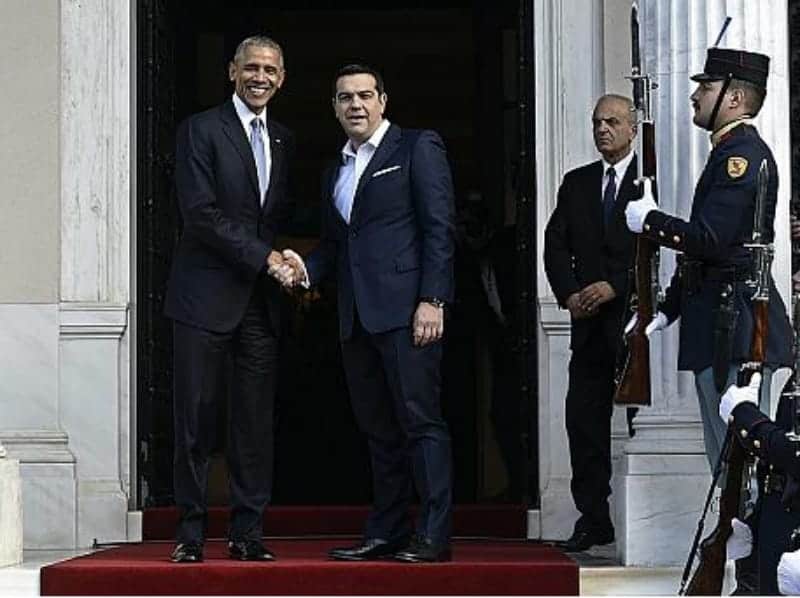
U.S. President Barack Obama landed in Athens yesterday and in a joint press conference with Greek Prime Minister Alexis Tsipras addressed the Greek media saying that the USA wants Greece and the Greek people to succeed and overcome the crisis adding that austerity cannot be the way forward.
"This crisis in not an abstraction. It has had a very concrete devastating effect on the lives and livelihoods of millions throughout the country," he said.
Obama’s discussions with Alexis Tsipras focused on the economic situation and how Greece can continue going forward. He said Tsipras had outlined the steps and reforms he will take to "prevent the kind of imbalances that led to the public debt crisis in the first place and make the country attractive to investments."
"We all want Greece to succeed, we all want the Greek people to prosper," Obama added, noting that this would be good for Greece, for Europe, for the United States and for the world.
Whilst acknowledging that Greece was continuing its reforms Obama also turned his attention to the country’s creditors noting that debt relief was crucial.
"I will continue to encourage the creditors to take the steps needed to put Greece on the path of recovery," he said.
"Austerity as a strategy" cannot be the way to generate growth, the U.S. president added, noting that Greeks had to see improvement in their daily lives.
Among the economic problems discussed with Tsipras, Obama added, were the serious challenges they faced as allies in NATO and he congratulated Greece as one of only five countries in NATO that continues to spend 2 pct of its GDP on defence, even during the difficult years of crisis. If even crisis-stricken Greece was able to meet this target, he noted, then all the NATO allies should be able to do the same.
Obama said they also discussed the importance of exchanging information in order to prevent terrorist attacks and maintaining sanctions, including those of the EU, against Russia until Russia fully meets its obligations on the basis of the Minsk agreement.
The U.S. President praised the "extraordinary compassion shown" by Greeks, especially on the islands, toward migrants and refugees in spite of their own economic hardships. He said that Tsipras had promised to increase housing for migrants and refugees and access to education for children. He promised that U.S. will continue to help with refugee crisis as much as it can, noting that the problem was not Greek but international.
Obama said he had also reaffirmed the support of the U.S. for the agreements between the EU and Turkey as the best way of dealing with the arrivals in Europe in an orderly and humane way.
On the Cyprus issue, the U.S. president said that the "prospects for a just, comprehensive and lasting settlement are the best they had been for some time."
"This does not mean that success is guaranteed," he clarified, but that a possibility for resolving a decades-long conflict is there. He said a bizonal, bicommunal solution was in the best interests of all Cypriots, leading to a solution that was viable in the long term and create prospects for all people on Cyprus.
"Such a solution is possible and it would be an excellent example for the world, showing what diplomacy can do," Obama added.
Replying to press questions on his country’s unemployment and GDP as compared to the results in Greece during the years of crisis, and whether Greece's programme was attainable without debt relief, Obama noted that the two economies were not strictly comparable though both had experienced severe economic contraction and lost jobs.
Obama said he had taken over at a time when the U.S. economy was contracting faster than during the Great Depression but "we took measures, learned from our mistakes, stabilised the economy and returned to growth."
"One of the lessons we learned is this: it is important to combine structural reforms and good fiscal stewardship, along with a growth strategy," he said, noting that cutting spending when the economy was contracting would lead to further contraction. The U.S. president admitted, however, that the U.S. was in a better position to do this than Europe, since it was one country and also had the dollar, which continued to be the world's reserve currency, giving it greater flexibility.
"The key lesson we drew from our experience was that particularly when the economy is still struggling, putting people back to work and doing things to spur economic activity -ultimately this is the factor that reduces structural deficits and debts."
Obama noted that Greece had carried out difficult structural reforms, committed to making changes and given what all the Greek people have been through, there was an opportunity to recognise the need to arrive at a solution, instead of coming back every year or six months a new negotiation with creditors.

